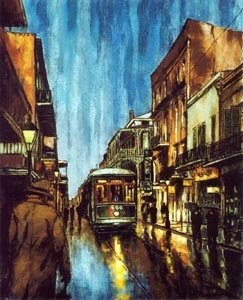Streetcar named Desire is Blanche's desire. Although Blanche arrives in New Orleans as a somewhat broken woman, she keeps alive her desire to be with a man and to lead a life as an elegant, respectable woman.
Streetcar named Cemeteries is the old, disgraced Blanche, which she left behind–dead, so to speak–in her hometown of Laurel, Miss., to begin anew in New Orleans. This streetcar can also suggest that life is over for the new Blanche as well, for she is damaged property edging toward madness.
Street named Elysian Fields is the new life Blanche is seeking. In Greek mythology, the Elysian Fields (also called Elysium and the Elysian Plain) made up a paradise reserved for worthy mortals after they died. Because Blanche's old self "died" in Laurel, Miss., she traveled to New Orleans to seek her Elysium.
Belle Reve This is the name of Blanche's family home in Mississippi. It represents the "beautiful dream" (the meaning of Belle Rêve in French) that Blanche seeks but never experiences.
Blanche's white suit is the false purity and innocence with which she masks her carnal desire and cloaks her past.
Blanche's frequent bathing is her attempt to wash away her past life.
Alcohol is another way Blanche washes away bad memories.
Bright light is the penetrating gaze of truth that sees the real Blanche with all of her imperfections. When she greets Stella the first time in the apartment, she says, "And turn that over-light off! Turn that off! I won't be looked at in this merciless glare!" Blanche avoids bright lights throughout the play.
Blanche: Blanche means white in French, and–in keeping with her name–she wears a white dress and gloves in the opening scene of the play to hide her real self in the purity that white suggests.
Stella: Stella means star or like a star in Latin, although she lives in a shabby apartment building in a lower-class section of New Orleans. It could be argued that she is the star of her husband’s life and the star that led Blanche to New Orleans.
Stanley: Stanley is an Old English name meaning stone field. Thus, it is possible he represents a cemetery for Blanche. Stanislaus was the name of a king of Poland. Clearly, Stanley is the king of his household.
The small Kowalski apartment: The size and plain surroundings of the apartment suggest the size and plainness of the life to which Blanche, who formerly lived in a splendid mansion, must adjust.
Allen Grey: The memory of him symbolizes a gray area of Blanche's life, between the bright light that she avoids and the darkness she seeks. She loved him, but he betrayed her. In New Orleans, she remembers the good and the bad of her relationship with him.
Paper: Imagery centering on paper represents impermanence, unreality, or artificiality. For example, the paper legal documents Blanche brings with her to New Orleans attest to the loss of the family homestead, Belle Reve. The youth collecting for the local paper, The Evening Star, represents the ephemerality of sexual gratification. Apparently, he reminds her of Allen Grey. On a whim, she suddenly kisses the youth but then dismisses him, mindful of the disgrace she brought upon herself with her liaison with a student. The song Blanche sings while bathing, "Paper Moon," symbolizes the fantasy world of love.
Wednesday, April 18, 2007
Subscribe to:
Post Comments (Atom)



No comments:
Post a Comment